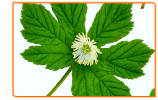3 Easy Ways To Combat Menopausal Symptoms With Black Cohosh
 Black cohosh is one of the leading natural supplements used to treat menopausal symptoms. Until recently, scientists believed that black cohosh contained phytoestrogenic compounds (plant-based estrogens) that mimic the effects of naturally occurring estrogen in the female body, thus restoring hormonal balance.
Black cohosh is one of the leading natural supplements used to treat menopausal symptoms. Until recently, scientists believed that black cohosh contained phytoestrogenic compounds (plant-based estrogens) that mimic the effects of naturally occurring estrogen in the female body, thus restoring hormonal balance.
Although researchers now aren’t quite sure how black cohosh works, the herb is used by many women to alleviate the symptoms of menopause, such as hot flashes, night sweats, mood swings and depression.
How Can I Introduce Black Cohosh Into My Lifestyle?
Like many of the herbs used to treat menopausal symptoms, black cohosh comes in many forms, making it easy for you to introduce into your daily routine. Keep reading below for the top three ways to use black cohosh to combat menopausal symptoms.
1.) Black cohosh tablets
The recommended black cohosh dosage is 40 milligrams per day in pills that have the equivalent of 20 mg of root per tablet.
2.) Black cohosh tincture
Recommended dosage of black cohosh tincture is three times per day added to water or tea. Two capsules or tablets should do the trick.
3.) Black cohosh tea
The University of Maryland Medical Center notes that black cohosh tea may not be as effective in relieving menopausal symptoms as its standardized extract counterpart. Nevertheless, for avid tea drinkers, black cohosh tea can be prepared by putting 20 grams of dried root in 34 ounces of water, bringing the water to a boil, and then allowing the water to simmer 20 -30 minutes, until the liquid is reduced by one-third.
The mixture should then be strained, covered and stored in the refrigerator for up to 48 hours. The University of Maryland Medical Center recommends drinking one cup 3 times daily to reap maximum benefits.
Recommendation
 A standardized preparation of black cohosh is recommended for relief from menopausal symptoms during menopause. It may take 1-3 months to reap the benefits of this natural supplement. As always, you should consult with your doctor before introducing any natural supplement into your lifestyle to treat the symptoms of menopause.
A standardized preparation of black cohosh is recommended for relief from menopausal symptoms during menopause. It may take 1-3 months to reap the benefits of this natural supplement. As always, you should consult with your doctor before introducing any natural supplement into your lifestyle to treat the symptoms of menopause.
Click here to learn more about the benefits of using black cohosh to treat menopausal symptoms.



























